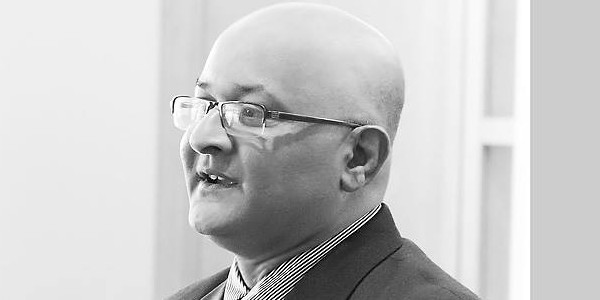
Q and A with Rowe School Director Binod Sundararajan
Management Dean Kim Brooks interviews Binod Sundararajan about challenges for new graduates, today’s relevant research and how alumni can stay engaged
The Faculty of Management has had the good fortune of recruiting outstanding directors to lead each of our four Schools. Many of you will have met or heard from Binod Sundararajan, Interim Director of the Rowe School of Business. We think that Binod is our first racialized director of the School and I’m excited to be able to work with him in this unprecedented and historic time.
In my time with the Faculty I have greatly enjoyed getting to know Binod. He is one of the kindest and most open-hearted people know. I suspect that his students (including some of our alumni!) have benefited enormously from his generosity.
When we first planned this, I was hoping I could interview Binod in person over coffee. How times have changed! Instead, my interview with Binod was as virtual as your reading of it will be.
Kim: What makes being the director of the RSB exciting?
Binod: At the time of this interview, I’ve been on the job for three days and it is every bit what I had imagined and witnessed over the years. RSB has been through some challenges, not unlike what other business schools experience. Some are internal, some external, some involving a search for a clear identity and some aspirational.
Having been a part of the School for the last twelve years, I have been fortunate to work with some amazing people. Despite constraints, faculty show up for coaching students, serving on committees, making intellectual contributions in their respective fields, and helping us steadily make a name for ourselves. And, the students! Students are willing to participate in events and they add to the vibrancy and atmosphere of the Rowe.
It is a privilege to be selected for this role. While it will be a challenging year ahead, it will be exhilarating, too. And it will help move the needle a bit towards RSB’s aspirational goals.
Kim: What do you most hope for the graduates of the School’s programs?
Binod: First, I hope that every one of our graduates are safe and able to secure and maintain fruitful employment in their chosen fields. Second, that they get a chance to apply all the great tools, techniques, and concepts they learned at RSB in their work. Third, I’d like them to know that we are immensely proud of their achievements. We would like to showcase them on our website and continue to celebrate them, so stay in touch.
Kim: What do you think is the biggest challenge for graduates?
Binod: As the country slowly opens up, organizations will need to decide whether they will rehire people that got laid off or hire the new graduates. Ensuring that everyone finds meaningful work and that we are able to reopen our businesses and organizations effectively and safely are big challenges.
Kim: What are you researching and why does it matter?
Binod: I’ve got many projects, but here are three that that are especially relevant right now:
- COVID-19: Reputational Benefits of Effective Crisis Communication. I am leading a team of researchers (from RSB & the School of Public Admin) and three student research assistants to understand whether messages sent by the provincial and municipal governments (using multiple channels) were effective in helping Nova Scotia and Ontario flatten the curve.
- TAEC Model of Diversity for Organizational Effectiveness. A model to overcome the limitations of “inclusivity” and provide better and more relevant sensitivity training. My team and I are empirically testing a model of diversity in the workplace that recognizes the need for cognitive and emotional processing time. This approach is necessary to reduce microaggressive behaviour towards diverse co-workers and gaslighting to diminish or dismiss minority opinions in the workplace.
- ConnecT Framework for eLeadership & Virtual Teams. This consultancy is based on SSHRC-funded research and revolves around a framework of how leaders can use cultural sensitivity and effective communication to navigate organizational complexities and conflicts to motivate their virtual teams, to stay on task, adhere to timelines and manage technology to achieve organizational goals.
Kim: How can alumni stay engaged?
Binod: Alumni will and do stay engaged! We already bring many into our classrooms as guest speakers, coaches, and judges for our case competitions. Alumni can be mentors (many already are). It’s great to pair alumni with student groups that have similar interests.